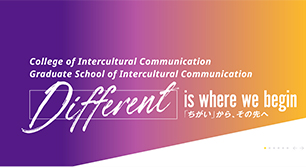Graduate School of Intercultural Communication
Ikebukuro Campus
OBJECTIVE.
The Graduate School of Intercultural Communication seeks to construct a new kind of intercultural communication studies, connecting language, culture, and nature with a view toward multicultural coexistence in all societies.
Features
Graduate School of Intercultural Communication
Communication between people with different cultural backgrounds is essential in the pursuit of peace and sustainability for humanity in modern society where the diversity of cultures and languages is the norm. From this perspective, we recognize the heterogeneity of cultures in the world, and also interpret our natural environment as another person in order to consider our coexistence with it as a goal.
At the Graduate School of Intercultural Communication students face real issues emerging in an increasingly complex world and contribute to the realization and sustainability of a society. Students develop a cross-disciplinary analysis through the exposure to the studies of Language Communication, Translation and Interpretation, Intercultural Communication, and Sustainability Communication. In addition, the Graduate School also offers the TESOL-J Program, which focuses on the teaching of English in the Japanese context. This interdisciplinary approach allows students to focus on an area of primary interest while also offering additional perspectives on the research and analysis of the wider field of communication itself.
At the Graduate School of Intercultural Communication students face real issues emerging in an increasingly complex world and contribute to the realization and sustainability of a society. Students develop a cross-disciplinary analysis through the exposure to the studies of Language Communication, Translation and Interpretation, Intercultural Communication, and Sustainability Communication. In addition, the Graduate School also offers the TESOL-J Program, which focuses on the teaching of English in the Japanese context. This interdisciplinary approach allows students to focus on an area of primary interest while also offering additional perspectives on the research and analysis of the wider field of communication itself.
Program
-
Graduate Program in Intercultural Communication
Overview
The four areas of study (Language Communication, Translation and Interpretation, Intercultural Communication, and Sustainability Communication) share an organic relationship. Students can freely take subjects from any area (including the TESOL-J Program) while focusing on their primary interest. Students will become researchers who act, becoming independent decision-makers and skilled individuals.
We offer a program for developing translation and interpretation professionals, and are pouring our efforts into developing interpreters and translators who can serve the needs of companies, groups, communities, hospitals, courts and others. Some graduate school students have taught Japanese to local community members as well as abroad. And students of the TESOL-J Program conduct their Practicum at local area schools.
Students are assigned a dedicated advisor to guide them, and they are encouraged to present their work and publish their research in the Graduate School of Intercultural Communication journal.
The Graduate School of Intercultural Communication is place where students can learn the knowledge and practices that are necessary to address the challenges of attaining peaceful coexistence as well as have the opportunities to put them into action.
Learn more
For more information, please visit the links below.

